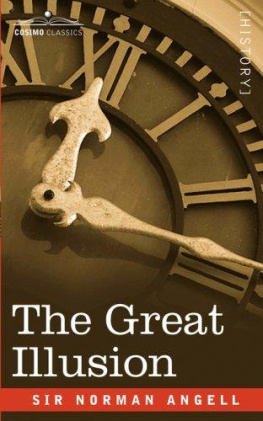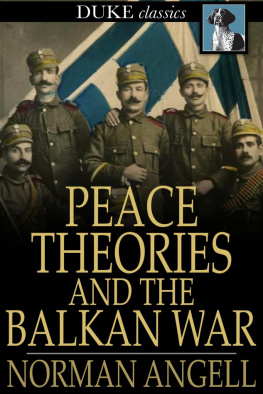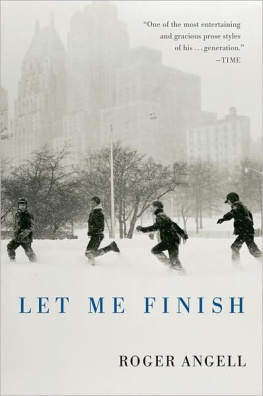THE GREAT ILLUSION
A STUDY OF THE RELATION OF MILITARY POWER TO NATIONAL ADVANTAGE
* * *
NORMAN ANGELL
*
The Great Illusion
A Study of the Relation of Military Power to National Advantage
From a 1913 edition
ISBN 978-1-62013-512-9
Duke Classics
2014 Duke Classics and its licensors. All rights reserved.
While every effort has been used to ensure the accuracy and reliability of the information contained in this edition, Duke Classics does not assume liability or responsibility for any errors or omissions in this book. Duke Classics does not accept responsibility for loss suffered as a result of reliance upon the accuracy or currency of information contained in this book.
Contents
*
Preface to the Fourth American Edition
*
If this, the fourth American edition, is bulkier than its predecessors,it is chiefly because the events of the last two years throw aninteresting light upon the bearing of the book's main thesis on actualworld problems. I have, therefore, added an appendix dealing withcertain criticisms based upon the nature of the first Balkan War, in thecourse of which I attempt to show just how the principles elaboratedhere have been working out in European politics.
That American interest in the problems here discussed is hardly lessvital than that of Europe I am even more persuaded than when the firstAmerican edition of this book was issued in 1910. It is certain thatopinion in America will not be equipped for dealing with her ownproblems arising out of her relations with the Spanish American states,with Japan, with the Philippines, unless it has some fair understandingof the principles with which this book deals. Its general interest evengoes farther than this: no great community like that of modern Americacan remain indifferent to the drift of general opinion throughout theworld on matters wrapped up with issues so important as those of war andpeace.
That the tangible commercial and business interests of America areinvolved in these European events is obvious from the very factors offinancial and commercial interdependence which form the basis of theargument.
That the interests of Americans are inextricably, if indirectly, boundup with those of Europe, has become increasingly clear as can be provedby the barest investigation of the trend of political thought in thiscountry.
The thesis on its economic side is discussed in terms of the gravestproblem which now faces European statesmanship, but these terms are alsothe living symbols of a principle of universal application, as true withreference to American conditions as to European. If I have not"localized" the discussion by using illustrations drawn from purelyAmerican cases, it is because these problems have not at present, in theUnited States, reached the acute stage that they have in Europe, andillustrations drawn from the conditions of an actual and pressingproblem give to any discussion a reality which to some extent it mightlose if discussed on the basis of more supposititious cases.
It so happens, however, that in the more abstract section of thediscussion embraced in the second part, which I have termed the "HumanNature of the Case," I have gone mainly to American authors for thestatement of cases based on those illusions with which the book deals.
For this edition I have thought it worth while thoroughly to revise thewhole of the book and to re-write the chapter on the payment of theFrench Indemnity, in order to clear up a misunderstanding to which inits first form it gave rise. Part III has also been re-written, in orderto meet the changed form of criticism which has resulted from thediscussion of this subject during the last year or two.
It is with very great regret that I have seen this book grow in bulk;but as it constitutes the statement of a thesis still revolutionary, ithas to cover the whole ground of the discussion, sometimes in greatdetail. I have, however, adopted an arrangement and method ofpresentation by which, I trust, the increase in bulk will not render itless clear. The general arrangement is as follows:
The Synopsis is a very brief indication of the scope of the wholeargument, which is not that war is impossible, but that it isfutileuseless, even when completely victorious, as a means of securingthose moral or material ends which represent the needs of moderncivilized peoples; and that on a general realization of this truthdepends the solution of the problem of armaments and warfare.
The general economic argument is summarized in Chapter III., Part I.
The moral, psychological, and biological argument is summarized inChapter II., Part II.
The practical outcomewhat should be our policy with reference todefence, why progress depends upon the improvement of public opinion andthe best general methods of securing thatis discussed in Part III.
This method of treatment has involved some small repetition of factand illustration, but the repetition is trifling in bulkit does notamount in all to the value of more than three or four pagesand I havebeen more concerned to make the matter in hand clear to the reader thanto observe all the literary canons. I may add that, apart from this, theprocess of condensation has been carried to its extreme limit for thecharacter of data dealt with, and that those who desire to understandthoroughly the significance of the thesis with which the book dealsitis worth understandinghad really better read every line of it!
One personal word may perhaps be excused as explaining certainphraseology, which would seem to indicate that the author is of Englishnationality. He happens to be of English birth, but to have passed hisyouth and early manhood in the United States, having acquired Americancitizenship there. This I hope entitles him to use the collective "we"on both sides of the Atlantic. I may add that the last fifteen yearshave been passed mainly in Europe studying at first hand the problemshere dealt with.
N.A.
LONDON, October, 1913.
Preface
*
The present volume is the outcome of a large pamphlet published inEurope at the end of last year entitled Europe's Optical Illusion. Theinterest that the pamphlet created and the character of the discussionprovoked throughout Europe persuaded me that its subject-matter wasworth fuller and more detailed treatment than then given it. Herewiththe result of that conviction. The thesis on its economic side isdiscussed in the terms of the gravest problem which now faces Europeanstatesmanship, but these terms are also the living symbols of aprinciple of universal application, as true with reference to Americanconditions as to European. If I have not "localized" the discussion byusing illustrations drawn from purely American cases, it is becausethese problems have not at present in the United States reached theacute stage that they have in Europe, and illustrations drawn from theconditions of an actual and pressing problem give to any discussion areality which to some extent it might lose if discussed on the basis ofmore suppositious cases.
It so happens, however, that in the more abstract section of thediscussion embraced in the second part, which I have termed the "HumanNature of the Case," I have gone mainly to American authors for thestatement of cases based on those illusions with which the book deals.
N.A.
PARIS, August, 1910.
Synopsis
*
What are the fundamental motives that explain the present rivalry ofarmaments in Europe, notably the Anglo-German? Each nation pleads theneed for defence; but this implies that someone is likely to attack, andhas therefore a presumed interest in so doing. What are the motiveswhich each State thus fears its neighbors may obey?













